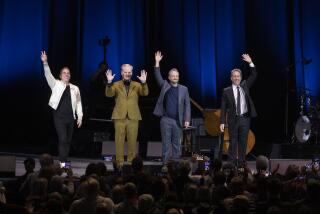TV, movie comedy writer won Emmy
Sheldon Keller, an Emmy Award-winning comedy writer who was part of the celebrated writing team on Sid Caesar’s 1950s comedy-variety TV show “Caesar’s Hour,” has died. He was 85.
Keller, who also was a founding member of the Beverly Hills Unlisted Jazz Band, died Monday of complications of Alzheimer’s disease at his home in Valencia, said his son, Casey.
On “Caesar’s Hour,” the hourlong show that ran on NBC from 1954 to 1957, Keller was among a group of writers whose ranks at various times included Mel Brooks, Larry Gelbart, Aaron Ruben, Michael Stewart, Gary Belkin, Mel Tolkin, Selma Diamond and Danny and Neil Simon.
Keller, who joined the show’s staff in 1955 and shared three Emmy nominations for best comedy writing while on it, told The Times 40 years later that working on the live show was “the best mix of terror and laughter.”
On a staff-written comedy show such as “Caesar’s Hour,” Gelbart told The Times this week, “it’s almost like a batting cage: People are throwing straight lines at you, and you try to hit them back with punch lines attached, and Shelly was very good at that. You just had to deliver, and he did.”
In the 1960s, Keller was head writer on “The Danny Kaye Show.” He also was a writer on the 1965 TV special “Frank Sinatra: A Man and His Music” and specials starring Sophia Loren and Carol Channing.
For the 1966 special “An Evening With Carol Channing,” Keller shared an Emmy for outstanding writing achievement in variety.
In addition to writing episodes of TV series such as “Make Room for Daddy,” “The Dick Van Dyke Show” and “MASH,” Keller co-wrote the 1968 comedy film “Buona Sera, Mrs. Campbell” and was a writer on the 1973 action movie “Cleopatra Jones.”
Teamed with Gelbart, he co-wrote “Movie Movie,” a 1978 satire of the old Hollywood double bills, which earned them the Writers Guild of America award for best comedy written directly for the screen.
As a producer, his credits included “The Jonathan Winters Show” in the late ‘60s, three years of Bob Hope TV specials and “House Calls,” the 1979-82 CBS sitcom.
In 1976, Keller, who played guitar and bass, joined banjo-playing actor George Segal and trombone-playing actor Conrad Janis in performing on Dinah Shore’s TV talk show to promote the Segal and Goldie Hawn movie “The Duchess and the Dirtwater Fox,” in which Janis also had a major role.
Keller enjoyed the experience so much that he, Segal and Janis began meeting in Keller’s Nichols Canyon home for Tuesday evening jam sessions.
Keller dubbed the group the Beverly Hills Unlisted Jazz Band.
Janis recalled this week that eight to 22 amateur and professional musicians would show up, occasionally including actors Jack Lemmon on piano and Hal Linden on clarinet. Up to 150 people would pack into Keller’s house to listen.
After about a year, the group started playing on Sundays at the Ginger Man, a Beverly Hills restaurant. “Before too long we had lines around the block,” Janis recalled. “We stayed there 4 1/2 years.”
An appearance on “The Tonight Show Starring Johnny Carson” led to the band’s performing at Carnegie Hall as the opening act for Steve Lawrence and Eydie Gorme.
“When you’re over 50, if you have any fantasies left, you may as well get on with them,” Keller told jazz critic Leonard Feather in 1981.
Over the years, the Beverly Hills Unlisted Jazz Band performed its Dixieland and swing music at hundreds of jazz festivals, as well as on talk shows, two PBS specials and in the 1986 movie “Nothing in Common.”
Janis said Keller, who worked as a stand-up comic in the Catskills when he was trying to break into comedy writing in the early ‘50s, was “killingly funny and a great ad-libber” both onstage and off.
A son of Polish immigrants who had created a successful corset manufacturing and retail business, Keller was born in Chicago on Aug. 20, 1923.
He attended the University of Illinois, where he appeared in college shows with fraternity brother Allan Sherman, who later gained fame for his “My Son, the Folk Singer,” “Hello Muddah, Hello Fadduh!” and other spoof and song parody albums.
During World War II, Keller left the university to join the Army in 1942 and served in the Signal Corps in the Pacific.
After the war, Keller worked in his father’s corset business, married his wife, Bitsy (whom he later divorced), and had two children. In 1951, he borrowed $500 from his in-laws and moved his family to New York City to pursue a career in comedy.
In addition to his comedy writer son, Casey, Keller is survived by his daughter, Jamie, and three grandchildren.
A memorial service will be held at noon today at Hillside Memorial Park, 6001 W. Centinela Ave., Los Angeles.
Instead of flowers, the family suggests that donations be made to charities supporting Alzheimer’s research.
--
More to Read
The complete guide to home viewing
Get Screen Gab for everything about the TV shows and streaming movies everyone’s talking about.
You may occasionally receive promotional content from the Los Angeles Times.






